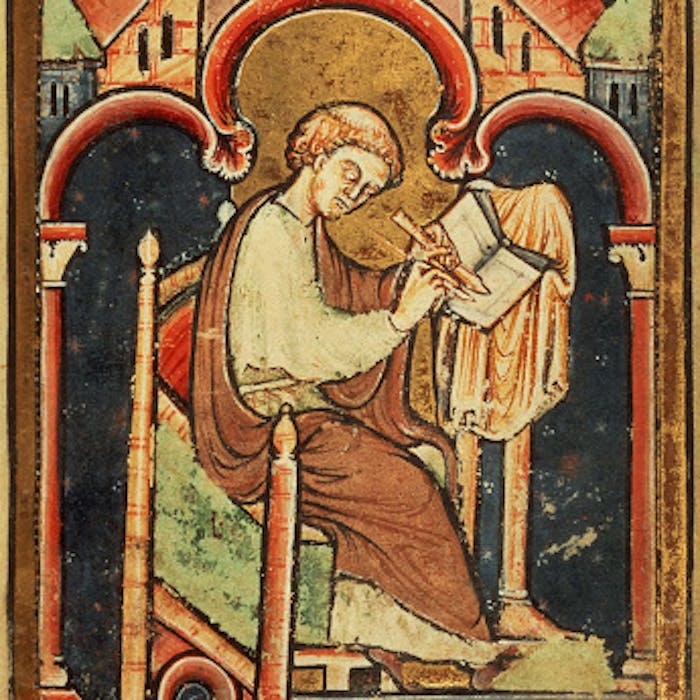
The Venerable Bede - Anglo Saxon historian
Bede, a monk of the important Northumbrian monastery of Jarrow in the 7th/8th centuries, is widely recognised as the greatest Anglo-Saxon scholar of his day. His most famous work, 'Ecclesiastical History of the English People', gained him the title 'The Father of English History'.
Bede's work made the Latin and Greek writings of the early Church Fathers more accessible to his fellow Anglo-Saxons, which contributed significantly to English Christianity, particularly when it was subsequently translated under King Alfred the Great.
It is thought that Bede was born in Monkton, Durham, in 672/3 AD, however there is no record of his family background. At the age of seven, he was put into the care of Benedict Biscop, who founded the monastery of St Peter at Wearmouth in 674 AD. In 682 AD, Bede moved to St Peter’s twin monastery at Jarrow on Tyneside where he spent the rest of his life, surrounded by the hundreds of books and manuscripts collected from all corners of Christendom.
During his lifetime Bede wrote around 40 books, dealing mainly with theology and history. With a special interest in numbers, he spent much time and effort investigating such things as the Church calendar, in particular attempting to calculate the precise date of Easter. Bede’s studies in this area also popularised the division of time into the BC and AD system that we still use today.
In his The Ecclesiastical History of the English People, completed in 731 AD, Bede details the conversion of the English to Christianity from the time of St Augustine through to the early eighth century. In the 200 years following Augustine’s arrival, it records the many stories of how the English went from being pagan to Christian.
Bede died in his cell at the monastery in May 735 AD. His works however remained immensely popular and influential; they were copied and dispersed across Europe, but it was back in England that they helped to inspire future generations.
Alfred the Great in particular adopted the model provided by Bede – in that the English were a single people that could be united under one rule. Translating the works of Bede into English, Alfred set about building a nation by combining the customs of Wessex, Mercia and Kent with the teachings and laws of the church.
Human remains thought to be those of Bede were discovered in the eleventh century and removed to Durham Cathedral. His tomb can still be seen in the Galilee Chapel there.
Bede became known as Venerable Bede (Latin: Beda Venerabilis) by the 9th century because of his holiness, but this was not linked to consideration for sainthood by the Catholic Church. His scholarship and importance to Catholicism were, however, recognised in 1899 when he was declared a Doctor of the Church.
Further reading
Links to external websites are not maintained by Bite Sized Britain. They are provided to give users access to additional information. Bite Sized Britain is not responsible for the content of these external websites.
